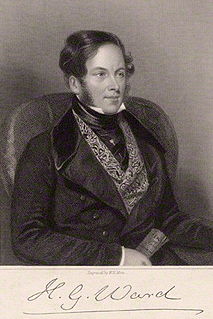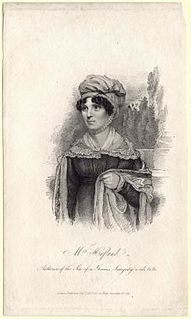
Who's Who is a source of biographical data on more than 33,000 influential people from around the world. Published annually since 1849, and as of 2015 in its 168th edition, it lists people who influence British life, according to its editors. Entries include judges, civil servants, politicians and notable figures from academia, sport and the arts.

Sir George Newnes, 1st Baronet was an English publisher and editor and a founding father of popular journalism. His company, George Newnes Ltd, continued publishing ground-breaking consumer magazines such as Nova long after his death.
Edinburgh was a burgh constituency of the House of Commons of the Parliament of Great Britain from 1708 to 1801 and of the Parliament of the United Kingdom from 1801 until 1885.

Sir Henry George Ward GCMG was an English diplomat, politician, and colonial administrator.
Entomologist's Monthly Magazine is a British entomological journal, founded by a staff of five editors - T. Blackburn, H. G. Knaggs, M.D., R. McLachlan, F.L.S., E. C. Rye and H. T. Stainton, and first published in 1864. The journal publishes original papers and notes on all orders of insects and terrestrial arthropods from any part of the world, specialising in groups other than Lepidoptera.

The Cornhill Magazine (1860–1975) was a monthly Victorian magazine and literary journal named after the street address of the founding publisher Smith, Elder & Co. at 65 Cornhill in London. In the 1860s, under editor William Makepeace Thackeray, the paper saw a large circulation, peaking at around 110,000. Due to emerging competitors, circulation fell to 20,000 by 1870. The following year, Leslie Stephen took over as editor. When Stephen left in 1882, circulation had further fallen to 12,000. The Cornhill was purchased by John Murray in 1912, and continued to publish issues until 1975.
Chapman & Hall is an imprint owned by CRC Press, originally founded as a British publishing house in London in the first half of the 19th century by Edward Chapman and William Hall. Chapman & Hall were publishers for Charles Dickens, William Thackeray, Elizabeth Barrett Browning, Anthony Trollope, Eadweard Muybridge and Evelyn Waugh.

The Surrey Institution was an organisation devoted to scientific, literary and musical education and research, based in London. It was founded by private subscription in 1807, taking the Royal Institution, founded in 1799, as a model. The Institution lasted only until 1823, when it was dissolved.
James Sprent Virtue was a British publisher.
John Debrett was an English publisher and compiler. His name has become associated with reference books.

The Illustrated Sporting and Dramatic News was an English weekly magazine founded in 1874 and published in London. In 1945 it changed its name to the Sport and Country, and in 1957 to the Farm and Country, before closing in 1970.

William Mudford, was a British writer, essayist, translator of literary works and journalist. He also wrote critical and philosophical essays and reviews. His 1829 novel The Five Nights of St. Albans: A Romance of the Sixteenth Century received a good review from John Gibson Lockhart, an achievement which was considered a rare distinction. Mudford also published short fictional stories which were featured in periodicals such as Blackwood's Edinburgh Magazine, Fraser's Magazine, and Bentley's Miscellany. His short story The Iron Shroud, about an iron torture chamber which shrinks through mechanical action and eventually crushes the victim inside, was first published in August 1830 by Blackwood's Edinburgh Magazine, and later republished separately in 1839 and 1840 with the subtitle "Italian Revenge". Edgar Allan Poe is considered to have been influenced by The Iron Shroud when he wrote The Pit and the Pendulum having got his idea for the shrinking chamber from Mudford's story. Mudford was born in London, where his father made a living as a shopkeeper in Piccadilly. He was influenced by John Milton, Joseph Addison, Samuel Johnson, William Cowper, William Collins, Mark Akenside, Thomas Gray, and Oliver Goldsmith.
Thomas Davison was a British radical journalist and printer-publisher of a series of journals, including Medusa, the London Alfred, the Deist's Magazine, as well as the James Griffin-edited Cap of Liberty and the Robert Shorter-edited Theological Comet.
The British and Foreign Unitarian Association was the major Unitarian body in Britain from 1825. The BFUA was founded as an amalgamation of three older societies: the Unitarian Book Society for literature (1791), The Unitarian Fund for mission work (1806), and the Unitarian Association for civil rights. Its offices were shared with the Sunday School Association at Essex Street, on the site of England's first Unitarian church. In 1928 the BFUA became part of the General Assembly of Unitarian and Free Christian Churches, still the umbrella organisation for British Unitarianism, which has its headquarters, Essex Hall, in the same place in central London.
Bradbury & Evans (est.1830) was an English printing and publishing business founded by William Bradbury (1799–1869) and Frederick Mullett Evans (1804–1870) in London.
Solicitors Journal is a monthly legal journal published in the United Kingdom by the International In-house Counsel Journal, Cambridge. It was established in 1856. It was published by Wilmington plc until September 2017. It was previously published by Longman Group UK Ltd. It was published weekly until September 2017. It covers "practical and independent updates and analysis about the latest developments affecting the legal profession." The magazine has its headquarters in Cambridge.
William Devonshire Saull was an English businessman, known now for his activities as geologist, antiquary and museum-keeper, philanthropist and supporter of radical causes.

The Orsini affair comprised the diplomatic, political and legal consequences of the "Orsini attempt" : the attempt made on 14 January 1858 by Felice Orsini, with other Italian nationalists and backed by English radicals, to assassinate Napoleon III in Paris.










